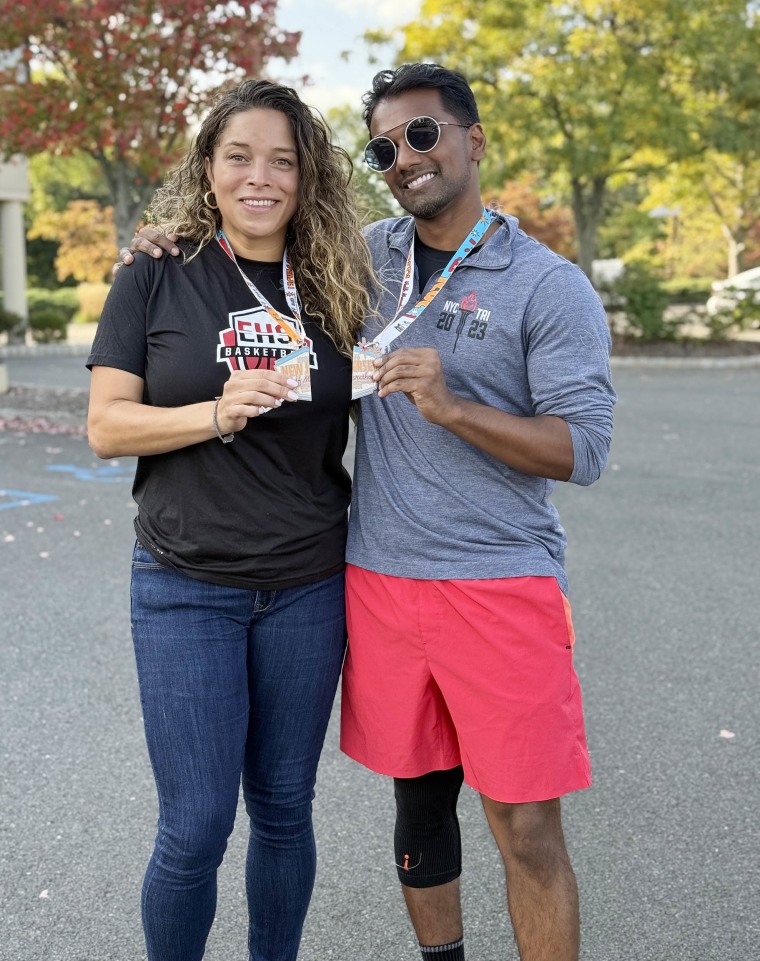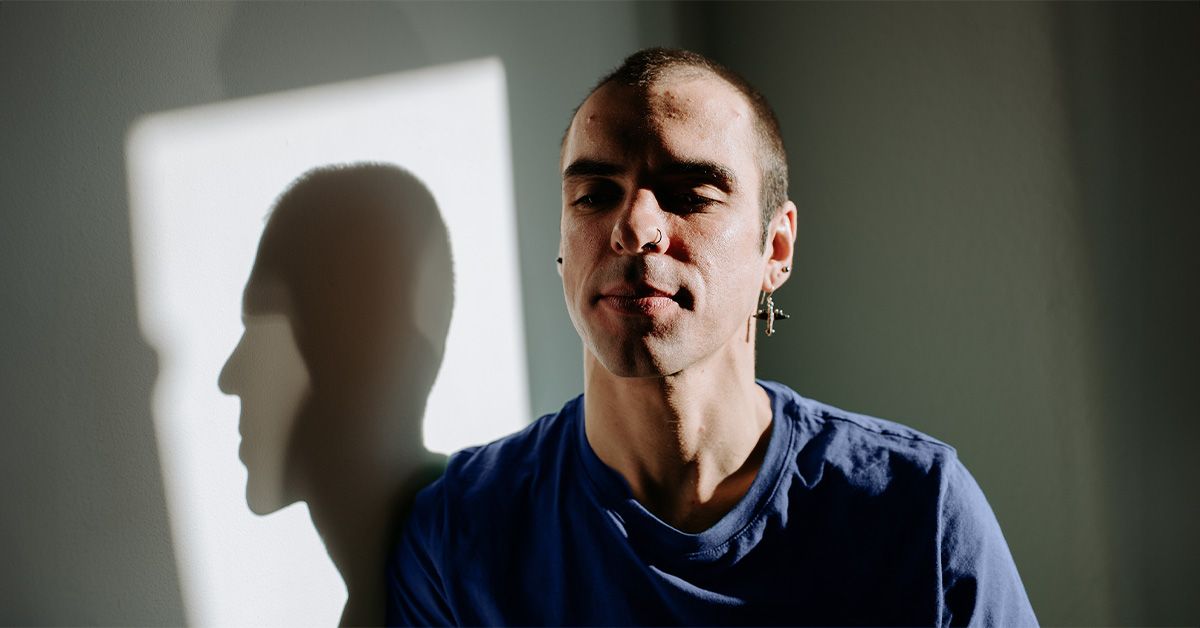Even in midst of a crisis, Chrystal Rinehold, who collapsed near the 7-mile mark of the Jersey City Half-Marathon due to a cardiac episode on Sept. 28, was in the right place at the right time.
Dr. Shane Naidoo, a marathon runner and emergency medicine physician for TeamHealth at JFK University Medical Center, saw her fall to the ground on the grass next to the race path and treated her before emergency responders arrived to the scene.
Naidoo’s care potentially prevented the mother of three from entering cardiac arrest, which could have cost Rinehold her life.
“There were a lot of runners that stopped to help, but I remember most just Shane’s compassion, his energy, pushing me to fight through it,” Rinehold tells TODAY.com.
“I felt like my heart was stopping”
Rinehold, 36, is a high school basketball coach at Elizabeth High School in New Jersey. She has been an avid long-distance runner for the past three years, racing in several half-marathons.
She has three kids and gave birth in February, but she still finds time to train “rigorously” for races, she says, running three to five days a week for 3 to 5 miles and incorporating longer 8 to 13-mile runs on the weekends.
Rinehold remembers “feeling fine” until the first stop for runners on the race, but in hindsight, she thinks she may have missed some earlier symptoms due to the adrenaline.
“Apparently, I was not looking good,” Rinehold says.
Feeling dizzy and light-headed while running wasn’t new to her, but what came next was. Her heart was pounding, and she gasped for air but could not get any.
“I actually physically felt like my heart was stopping. In the best way to describe it, I felt like my body was shutting down,” she recalls. “It was a really scary feeling.”
Still, she fought her body and kept running.
“I remember telling myself just to dig deep … to just find whatever air I could find,” Rinehold says. “That was a terrifying moment. I remember just mentally trying to survive.”
Then, unbearable chest pain consumed her body. Her memory is hazy, and she collapsed shortly after.
Moments before, Naidoo, 38, had walked out of a portable restroom — especially fortunate timing as the doctor, a frequent marathon runner himself, had never gone to the bathroom during a race.
“For some reason, I thought, ‘You know what? I need to use it. I’m going to stop, I’m going to take my time,'” Naidoo tells TODAY.com. “That seemed to be just the opportune time for her to get ahead of me.”
Preventing a cardiac arrest
After picking back up at a slower pace, Naidoo reentered the half-marathon. Then, he saw Rinehold collapse.
“She doesn’t have a traumatic fall, but she falls, and she’s in what’s looking like a pretty panicked and just not knowing where she is type of state,” Naidoo says.
Rinehold can’t recall the exact moment she fell.
“I do remember that right prior to that point, the feeling of everything turning off, and feeling dizzy, delirious, all of those feelings I had right before I went down,” Rinehold says. “I had that whole life-flash-before-your-eyes moment, and that was scary.”
When Naidoo went up to the scene, the people around her were confused. Naidoo describes the situation as the “bystander effect,” knowing that he would have to be the one to take charge.
Directing the panic of people, he told one person to call 911, another to find the nearest medical tent, one to find the nearest police officer and someone to support her head.
Naidoo got to work assessing Rinehold’s situation, first noticing her abnormal heart rate. The doctor immediately suspected Rinehold was experiencing paroxysmal supraventricular tachycardia, a fast heart rate that can be caused by dehydration and fatigue. He also suspected she had low blood sugar.
“When (dehydration and low blood sugar) combine, it can be very deadly,” Naidoo says.
When exerting yourself during a race, blood sugar can drop rapidly, which is why some runners carry edible gel packs, Naidoo says. Using energy gels he brought for himself, Naidoo fed them to Rinehold under her tongue.
Rinehold also received oxygen from a tank thanks to a police officer who had it in a car nearby, while Naidoo instructed others to support her to prevent her from inhaling any potential vomit.
The ambulance arrived after about 20 minutes due to the change in traffic pattern around the half marathon.
“Who knows if this would have proceeded to progress towards cardiac arrest? … We would have to do CPR on the roadside, which is never something that you want to do,” says Naidoo.

The doctor joined the emergency responders to take Rinehold to Jersey City Medical Center less than a mile away and told them what happened. Once she was stable, he returned to complete the race, finishing in 4,059th place in a time of three hours and 53 minutes.
Warning signs while exercising
Even for experienced, healthy runners like Rinehold, cardiac episodes are not uncommon, according to Naidoo.
“When we’re doing these types of activities, we’re in a fight-or-flight state … so our adrenaline is flowing,” he explains. “You have to fight through some of that pain. It’s a hard mentality to break in a lot of hardcore athletes.”
While you may be less likely to notice them due to adrenaline, there are often signs that you’re pushing your body too hard during a workout and you should slow down. These include:
- Chest pain
- Serious shortness of breath
- No longer sweating
- Dry mouth
- Heart palpitations or feeling that your heart is pounding out of your chest
If your chest pain doesn’t go away when you rest, call 911 or go to the emergency room, per the Cleveland Clinic. Heart palpitations along with severe shortness of breath, dizziness, chest pain or fainting are another reason to seek emergency medical attention.
When working out for an extended period, it’s also important to hydrate. Rinehold’s tests all “came back great,” she says, adding that doctors ultimately attributed what happened to severe dehydration. She’s now back home with her family, including her partner, Wally, and her children.
Read the full article here
















